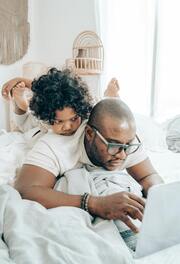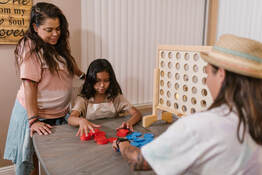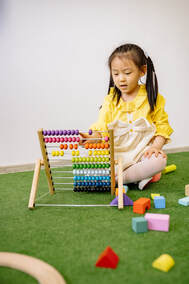|
Back to Blog
 Photo by Ketut Subiyanto Photo by Ketut Subiyanto A common issue that many parents of young children (3 to 8) seek help from me with is tantrums. Every child has them, but that doesn’t make them any less frustrating in the moment. This can especially be true when our child is old enough to use words to express their thoughts and feelings. We think, well, if they needed something, then they’d let me know. Since, however, this is often not the case for young children, it can cause us to mistakenly believe that there’s no real need behind the tantrum and our child is just making life difficult for us. In other cases, our children may use words and tell us what is wrong, but, sometimes what they say isn’t really what the issue is - especially if they are not fully equipped to tell us what they need and when they need it. A child being able to express their needs is often much more complex than just using words. Young children are still learning how their bodies work which means they don’t always understand the signals coming from their bodies, what they mean and how to verbalize it. This is when they turn to us for help and sometimes, that helps comes in the form of a tantrum. When it does, it can be tricky to try to figure out what they’re trying to tell us! What often helps parents I work with, is a reminder about some of the basic needs their growing children has. Below are a few of the basic needs of all children and even for us as adult. When your child is having an emotional outburst or meltdown, run through them in your mind and see if they apply. The solution to reducing their tantrum might be simpler than you think! Hunger Some children are able to recognize that a rumbly tummy = hunger. But this isn’t always the case. Your child may be too young to notice and to communicate hunger signals. Children who are having tummy problems can also have a hard time differentiating between being hungry and having an upset tummy. Instead of talking with us, we may then see a tantrum. If your child is having a tantrum ask yourself, “When was the last time they ate, and could an unmet hunger need be at the root of their tantrum?” Thirst Water is a basic human need for survival! But even as adults, we often misread thirst signals, so it’s not surprising that younger children often don’t realize they’re thirsty until they’re absolutely parched. And, being too thirsty can cause meltdowns, too. Just like with hunger, ask yourself when was the last time they had something to drink. Having a drink handy at all times (i.e. water bottles and juice boxes) can allow you to offer it to your child regularly instead of waiting for them to tell you that they’re thirsty. Support through illness As parents we know that when our child is not feeling well, they can get cranky, irritable and have tantrums in one form or another. Supporting a child through an illness can look different for many of us. I know for me, I automatically go into anxious mode at the thought of getting sick myself and being out of work. The ability to support my child, as well as myself, is vital when we are dealing with the basic need of nurture. Prioritize their recovery vs trying to stick to the “standards” you have about their daily structure and nutrition. For example, in my household, there’s a running joke that my daughter loves it when she is sick. Why? Because this is when I let go of the "should's" - she shouldn’t be watching too much tv; she shouldn’t be eating too much of x, y and z foods. Instead, I prioritize her rest, hydration, and nutrition. Meaning, when she’s sick, she gets to watch TV for hours and drink lots of juice (i.e. not watered down). Sore throat? She gets ice cream! Would a nutritionist or her pediatrician agree with this method? Don’t know and honestly, I don’t care. At this point, I do what works for me and my family. Rest, isolation (so everybody else doesn’t get sick! 😛) and hydration! These are the basic needs I take care of to prevent meltdowns. Connection with you Lastly, children need to feel connected with you – it’s as basic a need as food or water. But we all know how hard it can be to pencil in one-on-one time into our schedules. This is especially true when we have more than one child, we’re a single parent, or there’s just a lot going on. Not only is there not enough time for connection some days, but often as parents, we’re simply too drained. When we can figure out how to make time for one-on-one connection, however, it can pay off tremendously. Now, I’m not saying you have to carve out hours of your afternoon to do special activities together every day. All your child needs is to feel connected with you, which really means capitalizing on the time that you and your child already spend together. For example, you can meet their need for connection while you’re walking/driving to or from school and playing games like I Spy, or when you’re eating breakfast or preparing their lunch and talking about a show/program they enjoy watching. And connection isn’t just about having long, deep conversations – you can also connect nonverbally. Make eye contact and smile; Position your body in a way that lets them know, “You have my full attention!”; Give them a gentle touch on their back to let them know you are aware of their presence and love them. Takeaway & online workshop! Thinking about these things when your child is having a tantrum can feel trivial or “silly” – but they’re often the culprit, and we can help our children a lot by paying attention to these needs. Being mindful of the last time your child has eaten, had a drink, or slept – and if they might have a cold coming on can be extremely helpful. While I know this can seem too basic and that life is sometimes much more intricate than tending to these needs, know that being mindful of such things often gets lost in the day to day responsibilities. Plus, as our child grow, we rely more heavily on their ability to verbalize their troubles. Remembering the basics will allow us to make a tangible change if we’re aware of it. And when we are made away of it and implement those changes, it can make our lives a whole lot easier! But, I understand how parenting life can be so overwhelming and implementing a change can be daunting without the right guidance. This is why I've recently expanded my services to include in-person and virtual workshops to educate and remind parents about this! If you are looking for some first-hand tips and feedback on how you can better support your child's emotional well-being and learn how to make the most out of one on one time, then consider attending my next in-person parent workshop on 4/30! I also am hosting my popular virtual workshop on April 16th about tantrums, where I’ll review what you need to know about your child's development and how to help your 3 to 8 child with tantrums and meltdowns. I hope to see you, whether it’s in-person or online. Thanks so much for reading! Christine M. Valentín is a Registered Play Therapist™ who helps children 3-8 struggling with managing their emotions, Parents- who want to improve their parenting skills and Adults - who are concerned about an aging parent. As a Latina therapist, with 14 years of private practice experience, Christine loves helping people become a more confident version of themselves and develop better relationships within their family. To read her other blog posts, click here.
0 Comments
Read More
Back to Blog
 Photo by Keira Burton Photo by Keira Burton Do you feel that your child is very sensitive? And for purposes of this post, I don’t necessarily mean sensitive to emotions. I’m talking more about sensory sensitivity, or a heightened awareness of certain external stimuli. This might look like getting frustrated in loud spaces or not liking the feel of certain clothes on their skin. If your child is sensitive in this way, they’re not alone. Sensory sensitivity is a super common phenomenon among younger children. Sensory sensitivities are more common in neurodivergent children, like those with autism or ADHD – although some neurodivergent children don’t have any issues. In addition, these children aren’t the only ones who are sensitive to certain stimuli. It’s estimated that up to 16.5% of the general population lives with some sort of sensory processing challenges – meaning that it’s very normal and common! In fact, I would say that most children are sensitive to something. For example, they might hear a loud motorcycle zooming by and cover their ears, or not want to touch something because it feels “icky.” It’s completely normal to be sensitive to some things, both for children and adults. Just because your child is sensitive to certain sensory inputs does not mean that they have a disorder (like sensory processing disorder). Sensory sensitivities vary across individual children. Some children may be sensitive to certain stimuli, while others may not (or might be sensitive to different stimuli). There is a point at which these hypersensitivities could fit the bill for a diagnosis and extra support, so it’s important to talk to your child's doctor and/or a mental health provider if you’re concerned. But, in general, if it isn’t impairing their functioning (like their learning at school or their ability to make friends), then it’s probably within the “normal” range. In today’s blog, I’m going to go over 4 things that you may not have known your child is sensitive to. I’ll also give you some tips you can use to help your child when they’re upset about these things. Sensory sensitivities your child may have 4 different stimuli that your little one might be sensitive to can include: 1) Sounds Most children are sensitive to some sounds, especially those that imply danger. For example, your child might be afraid of the sound of thunder or cover their ears when they hear shouting. Think for a moment about when you are watching a horror movie or a tense TV show. When you pay close attention, you’ll notice there are sounds that tell us that danger is coming before we actually see it appear on-screen. Like the music ramping or changing melody or even hearing footsteps. As adults, it’s possible we may have learned to tune this out – but children can pick up on these “scary” sounds a lot easier than we can. Some of the things you may notice your child do when they are hyper aware of a sound can include suddenly covering their ears, running away, or telling you that they feel scared. They might also ask you to turn the TV off (or turn on the lights) before anything really scary jumps out at them on screen. They might even start having a tantrum. If you find yourself feeling confused in the moment (because the sounds don’t bother you), take it as a sign that your child is picking up on sounds that imply danger is coming and is probably scared. 2)Temperature Temperature is a big one for young children, and you may have noticed that they seem to have a different internal thermometer altogether sometimes. When you feel nice and toasty, they may tell you that they feel cold. Or you might feel chilly on a cloudy day, only for them to tell you that they want to jump in the pool. Strong reactions or insistence to have things their way when it comes to temperature of water, food, etc., can you be an indication they are sensitive. 3)Light Some children are sensitive to light. This may be light in general – for example, they may become very upset when the lights come on as they’re waking up – or only certain types of lights, such as the flashing lights of a police siren/ambulance. You might see them squinting or closing their eyes; they might ask you to turn the source of the lights off. If the light source continues to bother them, you may also notice a tantrum. 4)Texture Many children are also sensitive to textures, whether it’s the texture of their clothes or different foods. Even if they love the taste of the food, they might hate the texture – which can be confusing sometimes for us as adults. I remember, as a child, I hated a hot cereal called Farina. My Abuela would make it most mornings, with cinnamon and milk (nice and sweet) and while my siblings loved it — I just could not get over the texture! To this day, I can’t bring myself to eat it despite how good it smells. ;) In the same way, your child might be resistant to certain foods because they’re sensitive to texture, not because they don’t like the taste. And that’s typically not something that they can simply “get over” and for those who are non-verbal, something they can’t even articulate. How to help your child with sensory sensitivities Sensory sensitivities can be so hard to deal with because it often feels like they come out of nowhere. But in reality, it’s likely that your child is giving you signs that they’re uncomfortable or overstimulated way before the meltdown/tantrum happens. 1) Observe and Pay Attention Try to observe and listen to what your child is communicating, both verbally and non-verbally, and honor their needs the best you can. This often involves letting go of our own agenda, vision, or – often – need for perfection, and simply meeting our children where they’re at. I completely understand that this is often easier said than done. Verbally, it’s pretty simple, but you may not pick up right away on the fact that they’re saying these things because of sensory sensitivities. For example, a toddler might say things like, “I don’t like it,” or “Yucky,” or “I don’t want to wear it.” These statements confuse us sometimes as parents, especially when it’s about something they’ve done a million times before (for example, if they suddenly tell you they don’t want to wear something that they’ve already worn). But your child may be trying to tell you that they’re overwhelmed with the sensory stimuli. 2) Pay attention to non-verbal cues Flailing, squirming, or scratching are a few examples of non-verbal cues. You might also notice your child turn away from certain stimuli – for example, covering their ears or closing their eyes. These are all signs that they may be sensitive to something in their environment. 3) Honor what they need When we do pick up on the fact that our child is sensitive to certain sensory input, it’s important to honor where they’re at – even if we don’t necessarily understand. Here’s an example. My daughter absolutely hates jeans. She always has. The minute that denim texture hits her skin, she flails it off. But, I love how jeans look and I love to see her dressed in "cute" jumpers and a jean jacket. And, while I could push my own agenda and "mandate" her to wear the jeans for our family portrait, not only would I be upsetting her, but I’d be signing myself up for hours of tantrums and overall dysregulation for both her and myself. So...I gave up on jeans and I make sure to tell my relatives not to buy her anything jean material. For me, it’s worth it. 4) Your Child Is Not Alone I’ve heard similar stories from the parents I work with and understand that each child is unique and has their own needs. I recall one mom I spoke with who told me how her son would get really upset every morning when it was time to wake up. Feeling perplexed and annoyed by his intense, angry reaction every morning, she put her observation hat on and figured out that this reaction was set off whenever she turned on the bedroom lights. While her son did request she did not turn on the lights, it was dismissed because she didn't realize how much of a sensitivity it was for him. Once she and her child figured out how to modify the morning routine, mornings became much smoother for the both of them. Another parent I know uses headphones to help ease her child’s noise sensitivities at large gatherings. Does a pair of big headphones look “cute” with her dress? Absolutely not. Maybe people will even judge or critique. But, the headphones help her child cope better in loud spaces which means the parents can enjoy themselves and not have to sacrifice their fun time and worry about their child being uncomfortable. Sometimes, being able to put aside our own parenting goals/agendas and simply attuning to what our child’s needs can make the whole parenting experience a lot easier. That’s all I got for this month but if you want more insight on how to help your little one, check out my other blogs or join me at one of my online parenting workshops! On March 20th, I’ll be hosting a virtual workshop on how to help your child with meltdowns and other behaviors. This workshop is specifically designed for parents of children aged 3 to 8 who want to learn how to manage a demanding or bossy child, decrease opposition, and reduce aggression. You can sign up here. Hope to see you there! Thanks for reading! Christine M. Valentín is a Registered Play Therapist™ who helps children 3-8 struggling with managing their emotions, Parents- who want to improve their parenting skills and Adults - who are concerned about an aging parent. As a Latina therapist, with 14 years of private practice experience, Christine loves helping people become a more confident version of themselves and develop better relationships within their family. To read her other blog posts, click here.
Back to Blog
 Photo by RDNE Stock project Photo by RDNE Stock project Love, according to the Oxford dictionary, is "an intense feeling of deep affection." Two years ago, I featured a 3 part series related to how parents and children and enjoy quality time with each other through various simple, interactive games. Games that don't require you to purchase anything and that you can even do while waiting on the long supermarket line. Below is a summary of that 3 part series, including the games that I most often recommend to the parents I work with who have children between 2-8 years old. Games that Include Making Eye Contact- Looking into your child's eyes is a form of non-verbal communication that is intimate because it allows us to be present with one another. A few eye contact games that I often recommend in my practice include:
Games that Include Touch- Games that involve touch are important for a child and for us as human beings because research has shown how infants actually thrive when touched and how nurturing touch allows us to feel connected and loved. Below are a few games/activities that involve touch.
Activities that Include Verbal Affirmation- For those of you familiar with the 5 love languages, the concept behind words of affirmation is to verbally express how much we love and appreciate your loved one. For kids, it can look a bit different depending on the age but here are a few suggestions that can be used throughout your daily routine. 1). Write a note/draw a picture - in case you've missed it, food marketers now sell snacks with wrappers you can write on. See what I'm referring to here. These opportunities to write or draw a picture for your child while you are away from them can reassure them that even though you are apart, you are still thinking about them. Don't want to buy these kinds of items? I hear ya! Use post-it notes or good old-fashioned paper and tape. It's not about the item vs the note/drawing. 2). State what you love about them - during mealtime or bedtime, finish the following statement: I love your________ (eyes, ears, smile, laugh) because _________ (your eyes sparkle so bright, your ears hear so well, your smile lights up a room, your laugh is so contagious). The purpose behind making such a statement is to highlight the greatness of your child. Avoid commenting on what they are wearing or how their hair looks. Instead, focus on who they are. This can take some practice to get used to doing but with practice it is doable. If you find yourself struggling with this one, simply state what you notice about them. For example, I love your brown eyes., I love your big smile., I love your loud laugh. 3). Sing a Song - for some parents, it can be hard to verbally express their love directly. This is where singing and dancing can come in. Under the guise of the lyrics in the song, a parent/guardian can lip-sync the words of the song to the child. The key to doing this is to make sure you are looking and pointing to your child so they know you are "singing" to them. Depending on your child's age, a lullaby can also help; Think, Twinkle, twinkle little star. Non-verbal Cues to be aware of with the games mentioned: For eye contact games/activities: Some children can be uncomfortable making eye contact due to various issues. If you find your child is not engaging in the games I mentioned, don't push the issue. Just work around it if possible or if you believe it is better, don't play these games at all. For physical touch games/activities : some children are sensitive to touch. For some, touch can be too ticklish or painful which can dysregulate them. For others, the proximity of having someone close to them may be triggering. If you find your child is not playing along and instead tries to hit you or to turn it into a different game, it could be a sign that they are uncomfortable and it may be best to switch up the game or not play at all. For activities that involve affirming your child: being able to verbally express yourself as a parent/guardian requires your patience and insight into knowing what you are capable of giving. It will also require you to not expect anything in return from your child. Words of affirmation are meant to celebrate your child's greatness without expecting anything in return. If you expect our child to reciprocate what you are saying, then it will change the nature of the interaction from one of unconditional love to conditional love. For some additional tips on how to play games with your child, check out this blog post I wrote. Thank you for reading and I wish you and your loved one a Happy Valentine's Day! Christine M. Valentín is a Registered Play Therapist™ who helps children 3-8 struggling with managing their emotions, Parents- who want to improve their parenting skills and Adults - who are concerned about an aging parent. As a Latina therapist, with 14 years of private practice experience, Christine loves helping people become a more confident version of themselves and develop better relationships within their family. To read her other blog posts, click here. To check out her latest workshops or courses, click here.
Back to Blog
Death, Divorce, and Loss: How to Discuss Difficult Topics with Children, and Why It’s So Hard1/8/2024 *A Personal Note from Me to You* As I write this post, I realize it may be difficult for some of my readers to read and/or to process as I myself am noticing a sad response my body is experiencing as I write these words. And, while I can simply discard this post and talk about things that won’t cause me or you to feel “some kind of way”, I would be doing a disservice to the many children who need us, as parents, to learn how to talk about tough and uncomfortable topics. Therefore, please be mindful of your feelings as you read the words on my blog this month and if you need to take a break from reading it, go ahead. It will be here when you are ready. 🙂 Death, Divorce, and Loss: How to Discuss Difficult |
This Site is not intended to provide psychotherapy advice. The Site is intended only for use by individuals in search of general information of interest pertaining to anxiety, depression and related topics. Content is not intended to replace or serve as substitute for professional consultation or service. Contained observations and opinions should not be misconstrued as specific counseling advice.






